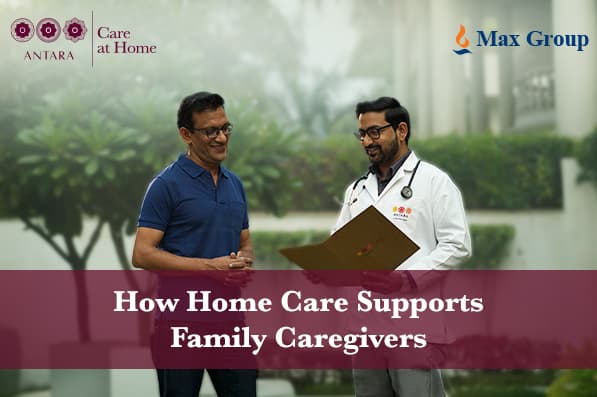
Loading...

Loading...
2025-05-26
Antara
Family caregivers tackle tough challenges every day. Half of them struggle with emotional strain and barely get time to rest. Many spend at least 8 hours each week caring for loved ones, while some put in more than 40 hours - pretty much a full-time job. The emotional toll on caregivers is profound, with a significant portion experiencing signs of clinical depression.

Professional home care services are a great way to get relief and support to these dedicated family members. These services help share the load and prevent caregivers from burning out or getting sick themselves. This comprehensive article dives into how home care family support works, its key benefits, and the right time to ask for extra help.
Family caregivers often find themselves thrown into a role they just need to handle without proper preparation or training. Caregiving's complex nature usually guides them toward physical, emotional, and mental exhaustion. Too much stress over time can damage a caregiver's health and increase their risk for conditions like heart disease and diabetes.
Caregiving tasks consume much time and energy each day. Caregivers who help only with household activities spend a significant amount of time on care tasks. The commitment becomes even more intense for those supporting someone with multiple self-care needs—often comparable to managing the workload of two full-time jobs.
Family caregivers' emotional burden runs deep. They often feel angry, frustrated, worn out, and sad. These emotional strains show up as:
Real-world challenges make everything harder. Role confusion becomes common, especially when someone must quickly become a caregiver while being a spouse, child, or friend. Money problems add extra stress as costs for medications, medical supplies, and healthcare expenses pile up faster.
Communication becomes the biggest problem, especially when you have elderly relatives with cognitive changes. Care recipients' agitation, frustration, and verbal outbursts make understanding their needs difficult.
Family caregivers often become socially isolated as they spend more time on care duties. Their relationships with friends, family members, and partners suffer because they have nowhere near enough energy or time to maintain these connections.

These challenges persist while most caregivers lack proper support systems. All but one of these caregivers eventually experience burnout, yet they receive minimal preparation for their role. This lack of readiness, combined with modern caregiving's growing complexity and intensity, creates overwhelming stress for people providing this crucial care.
Home care services bring personal healthcare right to people's homes, helping them stay independent and maintain their dignity. Unlike hospitals, home care gives custom medical and non-medical help that fits each person's needs. This helps family caregivers balance care duties with their daily lives.
Respite care gives family caregivers temporary relief so they can rest, travel, go to appointments, or spend time with others. This vital help prevents caregiver burnout, which often affects people who provide ongoing care. You can arrange respite care from a few hours to several weeks based on your needs. Trained staff make sure your loved one gets proper care and company during this time.
Home care improves older people's quality of life significantly. Studies show that seniors who get home care report better quality of life and visit doctors less often yearly. Older people who stay at home usually stay healthier, recover faster, and live longer. This happens because:
Home care has big emotional benefits for care recipients and their families. Professional caregivers provide companionship that helps fight loneliness, which is common among elderly people. Family members feel peace of mind knowing their loved one gets quality care. This emotional support creates an environment that helps everyone involved.
Families should look into professional support when caregiving starts affecting their well-being or when their loved one needs more help than they can give. Here are signs it might be time:
Professional home care lets family relationships grow naturally instead of being all about caregiving.
Family caregivers carry heavy burdens that can lead to physical and emotional strain. Professional home care services provide a vital lifeline that helps both caregivers and their loved ones. These services give family members much-needed breaks while their relatives receive quality care.
A balanced approach with professional home care prevents burnout among family caregivers. It also brings several benefits, including helping caregivers find time to look after their own health and personal needs.
Many families feel hesitant to ask for outside help. Yet professional support deepens their commitment to the overall care network, and both the caregiver and care recipient end up feeling better.
Professional home care services create the perfect partnership that values family caregivers' dedication while offering specialised help when needed. This balanced approach will give loved ones the best care possible while protecting the well-being of those who care for them most.
Family carers often worry about fitting professional care into their routines. Home care services adapt to your schedule, not the other way around. Professional caregivers can support you during specific time slots when you need to work, attend to personal matters, or take a rest.
Feeling overwhelmed comes naturally when managing caregiver responsibilities. Research shows caregiving responsibilities create heavy emotional strain that often leads to stress and depression.
Professional carers know how important consistency and routine are for clients and family caregivers. In-home care equips you to stay in your home while retaining control of your routines and quality of life.
You might need respite care if:
Family caregivers often feel guilty when considering outside help. Getting professional care will give your loved one the best possible support. It will also allow family members to take care of their health and responsibilities.

10 healthy meals for seniors that are Quick & Easy to cook

Understanding the Role of Family Involvement in Assisted Liv...

Essential Winter Nutritional Food for Seniors: Diet Tips

A Complete Guide to Choosing the Right Elder Home Care Servi...

How Does Climate Change Affect Senior Health? How to Protect...

Please fill in the form and submit the details to request an appointment.